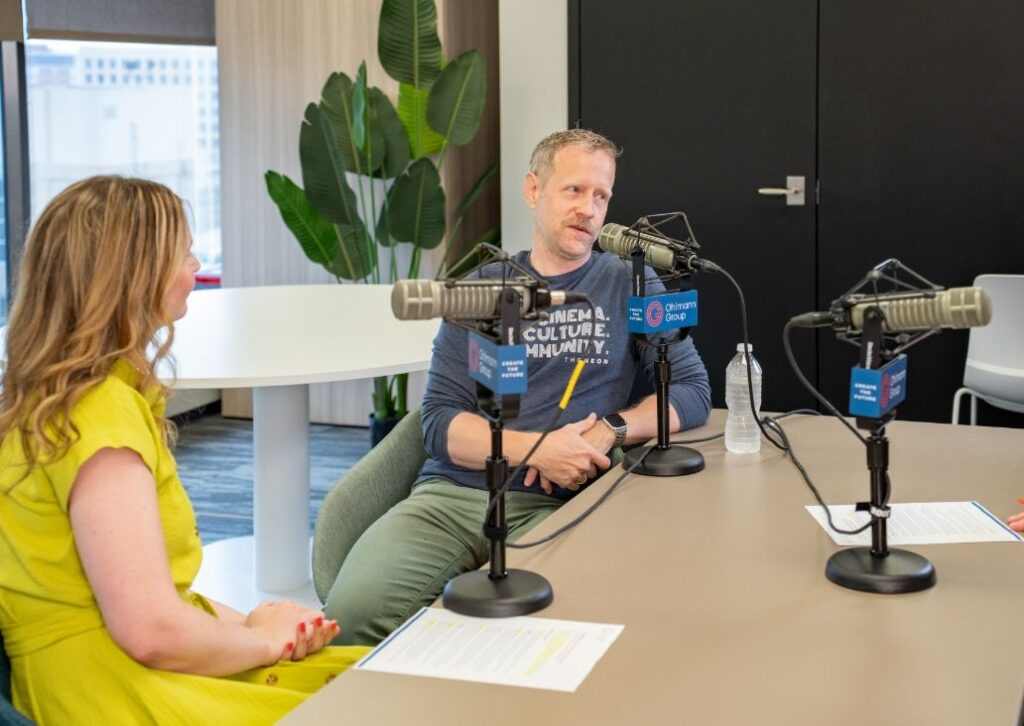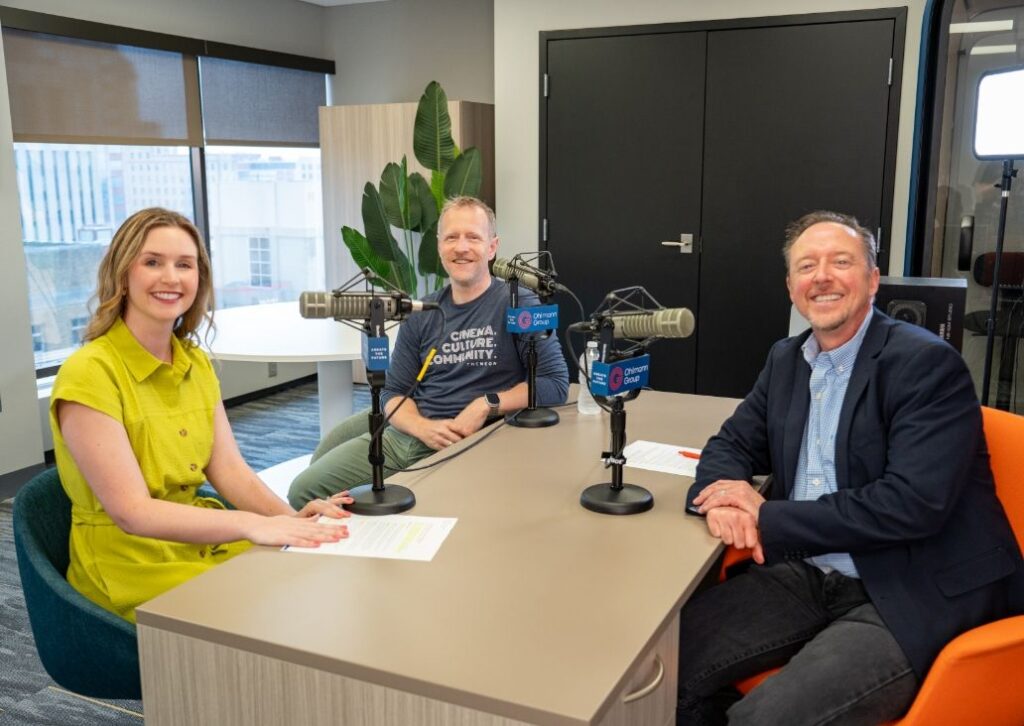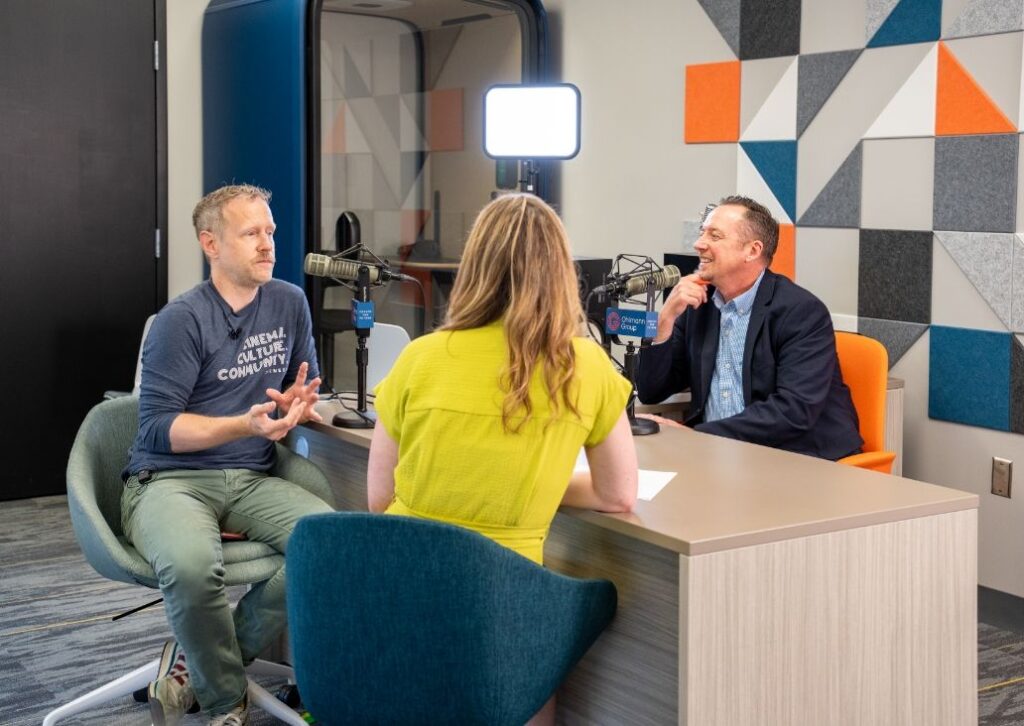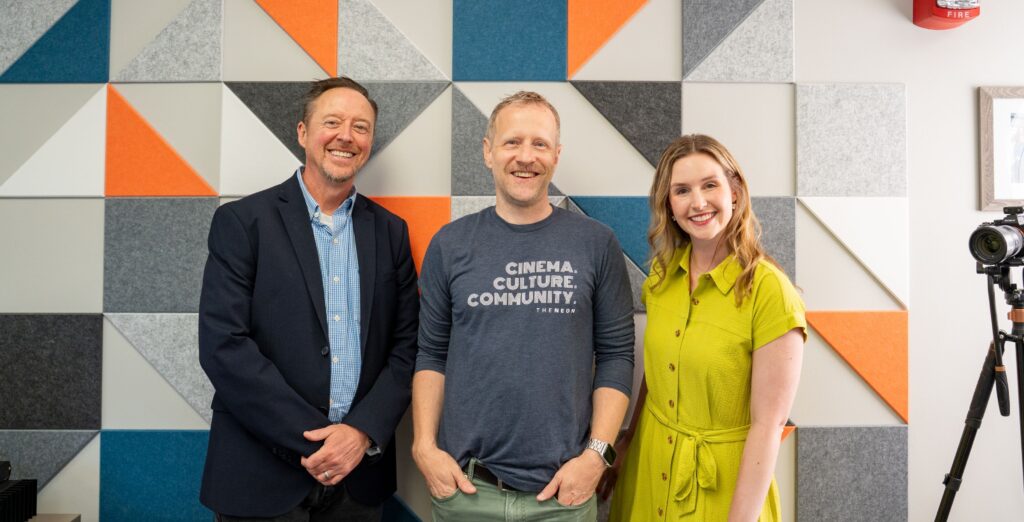Jonathan McNeal is a filmmaker, philanthropist, and General Manager of The Neon, Dayton’s non-profit, independent art-house movie theater. In this episode, Jonathan shares his journey from film student at Wright State University to film curator, his contagious passion for the shared experience of cinema, and the many innovative ways The Neon is connecting the Dayton community through art and placemaking.
Listen Now:




Episode Transcript:
Evelyn Ritzi: Welcome to Creating the Future. I’m Evelyn Ritzi
David Bowman: And I’m David Bowman,
Evelyn: And today we’re joined by Jonathan McNeal, the manager of downtown Dayton’s independent non-profit art house movie theater, The Neon.
Jonathan McNeal: Hi there. Thank you. Thanks for having me. I appreciate it.
Evelyn: Glad you could join us. Well, let’s start the beginning. Let’s start with you and your story. What first drew you to film, and then how did that path lead you to The Neon?
Jonathan: Well, it might be a little convoluted, but as a kid growing up, I was really fascinated by the Wizard of Oz. I was a huge fan and looked forward to that annual screening on television every year. And the children’s librarian knew of my interest and my love, and she is the one who led me to the fact that there were other books, and then there was a book about the movie, and then she wrote a little permission slip for me to go to the adult section and get out a book called The Making of The Wizard of Oz by AljeanHarmetz. And that kind of really changed my life. It was a film about behind the scenes and casting and special effects and all of those things that made the film. And it, you know, it started to sink in that there were people that made it, and there, there was, there were careers, and there were, you know, mechanisms at work to make this film. And so that’s kind of what spurred my interest in film, was that passion and love for Oz back in childhood and then growing up, I started to look into colleges, realizing that, you know, that there was a potential career field in film. And in seventh grade, I was going through a college catalog and found that Wright State in Dayton was one of the leading film schools in the country, and I knew that it had to be, I had to do a state school due to finances. I couldn’t do out-of-state tuition and whatnot. So it seemed kind of perfect. So by eighth grade, I’d kind of determined that I was going to go to Wright State and pursue film, which is what I did. It was a pretty cutthroat program back then, you know, over 100 kids applying for film school, and about 11 to 12 got into the junior year and taught by the best Julia Reichert and Jim Klein and Chuck Derry and all these incredible published authors and filmmakers winning, international awards and whatnot. So that’s the film basis. As far as getting to The Neon is concerned, it was while I was working on my senior thesis project, which is a documentary about the Rubi Girls, that The Neon was going through a major transition, going from one screen to two, and they were looking for a complete overhaul of staffing there. And I applied for the position, and long story short, I got it. You know, it was, there was some, some hurdles along the way, but, but CityWide Development was still in ownership of The Neon at that time, and it was Steve Budd, the president of that company, who I ended up meeting with and giving me the job.
David: Thank God for Steve, on behalf of all of us. It’s funny, you mentioned the Wizard of Oz. Like I remember, it seems like a whole different world, but I remember, I think it was like Easter time every year it was usually Easter, yeah, you’d wait the whole year you couldn’t watch the movie until then, right? And it was like a family event, like you would it was…
Jonathan: It was around, you know, pre, VHS, pre, you know, all of that. It was the one time of the year that you could see this movie. And, you know, I then eventually found it like at a classic cinema kind of, you know, like hot times, cool films used to happen in the Victoria. That used to happen to the Stambaugh Auditorium in Youngstown. And my mother took me to see it on the big screen. And that was pretty amazing, too. So that was around junior high time,
David: Yeah, oddly, I’ve never seen a big screen television back in the like, yeah, CBS, or whatever it was, that was the thing. But yeah, I don’t remember back then, movie theaters, common movie theaters having
Jonathan: Right, right, right. It certainly has had its re-releases over the years, even a 3d iteration of it about a decade ago. But yeah, it’s pretty spectacular on the big screen.
David: Can you tell us a bit about what your role is like and the creativity that goes into curating all of the various films? Shout out to neon
Jonathan: Well, so my role is, I’m the general manager, so I oversee hiring. I have a team in place that. Helps with the training of new staff, but I’m also bringing in films, working with a film buyer. Actually, the very first person that I brought on board was a woman named Jan Klingelhofer. She’s out of Oakland. She’s been in the film business since the 70s, and really has the connections to all the major distributors, and her name is well known. So I knew that coming into it, I had done some film curation on campus at Wright State when I was a student. I run, ran their cinema program for a couple years, and so I had a little bit of that, but I knew I didn’t have enough connections to start from ground level and be getting the great films that we needed to show at the neon so I brought Jan on board, and she helps. She goes to Sundance every year, sees most of the films that are at Sundance. And over the years, I’ve started going to Toronto Film Festival every year. So I see those, and between the two of us, we see almost everything that’s on the horizon in the film industry. So and we then collaborate and work together for what’s coming down the road. For us for traditional screenings. And by traditional, I mean those films that are playing multiple times a day every day. We book them for a week at a time, and then they hold over if they do well, they disappear if they don’t do well. So that’s one thing. Is our traditional day to day operation screenings, but we do a lot of special event screenings as well. A lot of those are facilitated by people renting the space and bringing a film that speaks to whether they’re a non profit organization and they want to show a film that speaks to their mission. Maybe it’s, you know, an Alzheimer’s related film, or maybe it’s a mental health-related film, or it’s an Environmental film, you know, any of those kinds of things, and that’s people renting the space from us. But we also do special, one time only screenings that we do in house, and those are films that maybe we’re partnering with the Dayton Art Institute, or we’re partnering with different organizations where we feel like we have something that that they would want to see, and they’ll help bring the audience for it as well. And sometimes it’s films like, you know, Edwin C Moses documentary. And we knew that Edwin would be a big draw and that people would be interested in knowing his story, so bringing him to town and showing that documentary, Moses 13 steps, or the six triple eight about charity, Adams, you know, that was a film that was going to be streaming on Netflix. And we knew, though, that there was an audience for it here, so we had to kind of fight and say to Netflix, Charity Adams was a Daytonian and a big champion of the city of Dayton. You know, we think that this film would do well here, and we ended up being one of, like, eight or nine cities in the country to play it, and it was one of our biggest grossing films of 2024 so, you know, so there’s, there’s a lot of things that go into, into the game of figuring out what to bring.
Evelyn: I’ve been to some of those events. I think it’s just so special, the way it brings community members together from all different corners of the community, and even you’ve done like talk-backs and panels to coincide with the films, and just add a lot more value. Can you talk about even like the patio parties that you’ve done, and what it means to you to bring community together in your space?
Jonathan: Well, we think that cinema is a really powerful tool, and so those talk-backs and things like that are ways to engage in dialogue that we think is really valuable. And that’s one of the things that we think seeing movies together why that’s so important. But the patio parties are a little different entity for us, that they are ways for us to bring the community together. We hope that people will then see what the Neon is all about and what our mission is all about, and come back for movies. But the patio parties are a way for us to find different guest hosts each week. So maybe it’s, you know, former mayor Ryan McClain, or maybe it’s the Dayton public radio station, or maybe it’s the boys behind the Rubi Girls. And each week, then those hosts bring their followers to just have a party on the patio, and it’s just a happy hour kind of vibe. There’s a DJ, there’s a food truck, we’ve got our bar open, and then those people start talking and seeing posters in the window at the neon and maybe chatting about what’s on the horizon or what’s playing that night, and will then come back so so it’s a little different way to build community and let them know what we’re up to.
David: When you look at the broader landscape of the film industry, especially you had mentioned Netflix before, right with the right. Streaming. What do you think makes the neon such a special experience, and what do you hope people take away when they choose to come see a film there instead of doing it from their home?
Jonathan: Well, streaming certainly has changed the landscape, absolutely and even. And during COVID, think how many streaming platforms you added in the last like five years ago, four years ago, you went from one or two Netflix and Prime maybe, to, you know, eight or 10 or 12, you know. So there are so many streaming platforms now and so much available to watch at home. But we do think that watching movies together is completely different. And even just a few weeks ago, I had a young woman tell me that she loved David Lynch films, but had never seen them with an audience before, and how it just heightened the reactions and just heightened her kind of passion for finding more. So that had been a screening of Twin Peaks: Fire Walk with Me and and now you know she’s already got her ticket for Blue Velvet, and she knows that, you know, so it’s, it’s seeing films together and creating that community and having that shared experience that really does make films feel different,
Evelyn: Yeah. And part of that too, you talk about, like, just the sheer number of streaming services and time spent scrolling to find something to watch at home. Like, the beauty of having the Neon is it’s so curated, it’s so special, that you can kind of just say, Well, I’m just gonna go to The Neon this weekend, and whenever I see it, I’m gonna like it.
Jonathan: You know, and I appreciate that because, you know, we really, it is curated, and there’s a lot to choose from in the marketplace, and we are very intentional as to what we decide to bring. And, you know, the multiplexes, pardon me, the multiplexes are gonna bring a film regardless, you know, Marmaduke 7, that costs, you know, $700 million to make. You know, you better believe that that distributor has put so much money into their marketing that a theater is going to be enticed to bring it because, you know, the marketplace has been saturated with, you know, telling people to go see it. For us, we’re looking at films and deciding, you know, this one’s for us, or these ones are going to have enough exposure other places. And it’s certainly changed so much though, over the years that a lot of what we play is being played at the market, you know, at the mainstream theaters, and that’s because they have 20 screens to curate, or to program, rather. And there isn’t that much new material that’s getting theatrical releases these days because it’s going right to streaming platforms. So it really is a decision, then, of the consumer to support us, and I am happy to say that a lot of the time we are outperforming the big box theaters in town.
Evelyn: And you have really good popcorn.
Jonathan: Thank you.
Evelyn: It’s an experience. You get popcorn. You can have an adult beverage, like it’s you got coffee. It’s a great experience.
Jonathan: Yes, thank you,
Evelyn: As a filmmaker, I want to talk about that a little bit, because people may not know, like Dayton has a film scene. And, you know, there’s Film Dayton, there’s local premiers, there’s up and coming filmmakers, but from your vantage point, how have you seen the local film community grow, and what role does The Neon have, maybe, in supporting that creative energy that’s happening?
Jonathan: Well, a large percentage of our rentals are filmmakers renting the space to premiere their work. So that’s that’s one way. But we have, we have seen the film community grow in a lot of different ways, especially in southwestern Ohio. You know, Dayton for sure, but Southwestern Ohio even more so. And we’ve seen a lot of producers and directors come to the area because we you can get a tax write off, or, you know, there’s a tax incentive. Rather, for shooting in Ohio, we have a lot of different varieties of places that can look like somewhere else. You can shoot in rural areas and make it look like, you know, the plains of Iowa. You can go places and shoot downtown Cincinnati and make it look like New York in the 1950s you know, there’s, there’s just such creativity in in that way that doesn’t have the price tag that comes with shooting in New York, or, you know, trying to create set pieces that look like something else. So, so there’s that. But back to the filmmakers. We we work with filmmakers for them coming to us, and then we also work with filmmakers because. In the festival scenario too. So like out here Dayton, which is our Queer Film Festival, is going into year 20, and that’s, you know, every year we’re working with filmmakers who are, you know, on the on the brink of huge success, and it’s been fun to watch some of those filmmakers really evolve. Where we’ve shown a film, somebody’s film from 18 years ago, and now they’re almost unapproachable, but they remember that they had a great experience in Dayton, Ohio, and are willing to bring their work back. So, so that’s kind of exciting.
David: Well, we won’t make you choose your top film, although you’re welcome to share that if you want to give us your greatest hits. But is there a movie that might surprise people, that you’re passionate about, that you like might be a guilty pleasure, or just one that’s kind of under the radar? What’s, what’s a movie that like you just love?
Jonathan: Oh, well, a movie that I just love. There’s a filmmaker that I’ve just loved, and that’s Pedro madovar. So Spanish filmmaker. The thing that people might be interested to know is, I don’t speak Spanish, but his films, you know, are always an event to me, like, can’t wait to see his latest films. This year, he had his first English language film, which was with Tilda Swinton and Julianne Moore and but his stuff all about my mother and talked to her and women on the verge of a nervous breakdown, which was his first film that I saw when I was in high school, and totally didn’t get it. But do, I loved it. It was so quirky and zany, and I didn’t, you know, I didn’t know about different terrorist threats around the world and whatnot, but somebody was dating a Shiite terrorist, and there were all these, all these crazy pieces at work, but it spoke to me in some way, and over the years, I just have embraced almadovar stuff so much. But if to most people, that wouldn’t be a surprise that that’s a film that I love. Almodovar, I’d say that, you know, lately, you know, sinners, I tend to not go for stuff that’s, you know, really mainstream and really but sinners was a mainstream film that, to me, was really an art house film that broke out. It certainly had the budget of a mainstream film. It had the talent behind it, but most people would not think that I’m going to be terribly interested in a vampire film. But sinners was so much more than that, and it really spoke to to so many things in American culture that I thought was really valuable in so many ways. And what’s been great too, is to see Ryan Coogler success with that film. You know, we played Ryan Coogler film Fruitvale Station years ago, and to see him evolve and start to create big Hollywood films, and now sinners, which is a standalone, not a franchise, not a you know, and just it’s exciting. And I will mention too, Hannah Beachler, who did the production design in that film, was a Daytonian, graduated from Wright State’s film program and won the Oscar for Black Panther. And so we’re excited to see that was one of the reasons why we brought the film to the neon in the first place, was because we’ve watched Hannah’s career develop over the last 20 years, and we’re excited to continue to honor her.
Evelyn: Yes, I mean, that film was astonishingly good.
Jonathan: Yeah, there was a musical number in the middle that is, like, just the best 10 minutes of film in a long time.
Evelyn: I think it’s the same scene that just had to be seen on the big screen. Like, yeah, it was just beautiful. So we know that fundraising is a part of what you do, and giving back to the community is a passion of yours, but we brought it up a couple times. But can we talk about Rubi Girls and your work with them, and the philanthropic impact that Rubi girls has had over the years.
Jonathan: Well, the Rubi Girls are a drag troupe that started in, you know, living rooms and attics when a bunch of guys were in college and were kind of broke, ultimately, and they decided that, you know, they start putting on shows for each other and invite friends over. And it was, you know, bath towels and bed sheets and a cassette tape. And you know, you’re on, you know, it was very spontaneous. It was very, you know, bring a six pack, and you can, you know, have admission to the party. And that grew and that energy and that creativity and that kind of community that they were building grew and grew to the point where people were standing on front porches just getting a glimpse in the window because they couldn’t fit in the house anymore. And that developed then into a spot where bars were saying. Saying, you know, we know we can make money if we give you our stage for the night so you can have it and you know, or maybe we’ll even give you some money to incentivize you to come and do your show with us. And they decided that that money was going to change the dynamic of the camaraderie that they had and this kind of other family that they were building, and they decided then to give that money away. And that’s been the mission all along. And now it’s, you know, that the Ruby girls have helped to raise over a few million dollars just by putting on bad wigs and sloppy choreography and but it’s but it’s funny, and it’s speaking on to pop culture, and it’s political, and it’s a lot of things that that really speak and strike chords with with the community at large. And Dayton has been really great to the Rubi girls, and that said, we’ve been great back. You know, we give money. We started with a focus on LGBTQ and HIV related causes, and then we realized, you know, HIV is still out there and is still in need of a lot of education and assistance. But we decided that with with so many new drugs and antiviral treatments and whatnot, that that that’s there’s some indication that there it’s less of a focus for us. We still, it’s still a focus, but it’s not our only focus. And so now we’re realizing that giving back to the community at large is is even more valuable, and it coming from a group of gay guys speaks and helps the LGBTQ community in a different way. When a group of gay guys is giving money to a shelter or a breast cancer organization or, you know, it, it kind of creates a little bit of a different understanding of that queer people aren’t only just others, but they’re part of the community.
Evelyn: Absolutely, I just want to reiterate, that was a couple million.
Jonathan: Few million. Yeah, yeah, yeah, you know. And sometimes it was parts of an event that raised a lot of money. And we can’t really qualify, we don’t know the exact number, because, you know, the Rubi girls helped with the red events, which were with equitas years ago and Miami Valley AIDS Foundation. And those events raised a half a million dollars sometimes, you know, in one evening, but the Rubi Girls were a big part of making that happen. So, what were we 5% or 6% or, you know, so it’s kind of hard to give an actual value to exactly how much we’ve raised.
David: And Wright State ties in with the Rubi girls as well, right? That’s right.
Jonathan:
That’s right.
Evelyn Ritzi 22:48
And briefly, you mentioned that you made the documentary. I did think a little bit about that process and what that was like.
Jonathan: So Rubi Girls, I started in shooting in ‘99 and I went, you know, I was working retail that time structure at the Fairfield Commons and Dayton mall, back and forth, and getting promotions every few months, and hopping to a bigger role in each store. And so I worked there for six years and so but I started shooting the documentary in 99 and then the neon happened in 2001 and in 2001 then for the first few months of my job at the neon, the neon was still under construction, so it was more of a nine to five job. So I’d work nine to five, and then I’d go and I’d edit from six to nine or 10 o’clock at night, at Wright State. And that’s when I really saw the piece start to come together. Is when I had those few months of time where I really focused, and then in 2003 I was I had started to submit a rough cut to film festivals. And I was, I had gone to New York to do my sound mix for the film, and when I came home, there was a letter from frame line, which is like the big momma of queer film festivals in San Francisco when they had accepted the film to play it at the festival. And, you know, Steve Bognar gave me a great piece of advice back then. He said, Let the film go live in the world before you bring it back to Dayton, like there’s already an audience for it in Dayton. So let it go prove itself, that it’s that it’s winning awards, and that it’s showing merit and whatnot. And then when you bring it back, it’s like, the big return, like, like, and it becomes even more valuable when you bring it home. And then, of course, when we premiered it here, we had, you know, news stations around and you know, it was a big, big to do. But I also think that the documentary helped. To get our message out to the community as to what Ruby was all about, and like Meredith Moss at the Dayton Daily News hosted a screening of it, just for people at Dayton Daily to learn how to talk and write about queer people and queer stories, and how to use pronouns and how to use how to address people who identify different ways. I mean, that was 20 years ago, 20 plus years ago, Meredith was invested in wanting to do right by the community. So yeah.
Evelyn: That’s very heartwarming to hear about that the community supported supported you. And one last question that we ask all of our guests, what’s the future that you want to create?
Jonathan: Well, I, you know, film, like I mentioned earlier, is a powerful tool, and I want to create a place where dialogues can happen. I mean, the space that we’re living in right now is so polarized and so full of hateful vitriol. You know, there needs to be a space where where communities can talk and express their concerns and not fly off the handle. And that’s the space I want to create.
Evelyn: I think you already are, you absolutely are well. Well, thank you. Absolutely. Thank you. Jonathan.
Jonathan: Terrific. All right. Thank you.
